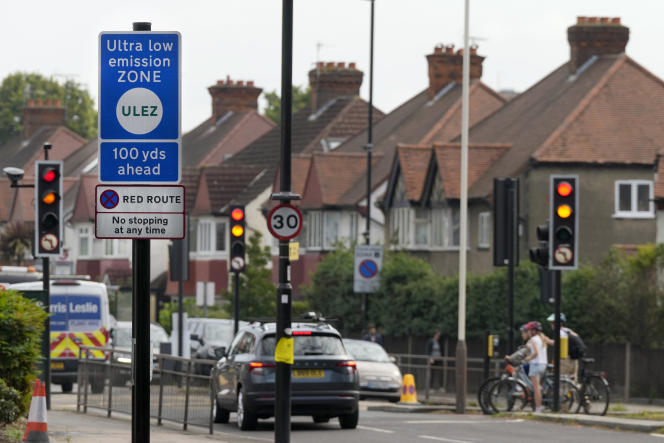The highly controversial extension of the tax on the most polluting vehicles in London comes into force on Tuesday August 29. The project, led by the Labor mayor of London, Sadiq Khan, is criticized by many residents. The promises of better air quality in the British capital come up against the reluctance of the latter, in the midst of the crisis in the cost of living in the United Kingdom.
The Labor opposition, which largely dominates in the polls, even paid for it at the polls recently, losing when it was given favorite in a local ballot in a constituency concerned by the extension of the tax. Labor leader Keir Starmer then asked Sadiq Khan to ” to reflect on “ to its decision to extend the ULEZ zone (to ultra-low emission zone, very low emission zone”), considering that it had cost ” without a doubt “ Labor election.
Restricted to central London when it was introduced in 2019, the ULEZ zone, which aims to ensure better air quality for residents, had already been significantly widened in 2021 and is being extended to all of Greater London on Tuesday. . For some observers, the extension of the tax could have consequences for environmental policy in the United Kingdom, whose long-term objectives collide with the short-term priorities of voters, in particular their purchasing power.
Breathe “cleaner air”
Despite criticism, legal action and sabotage – hundreds of ULEZ cameras have been vandalized in recent months according to the police – Sadiq Khan maintains his course. “We cannot afford to ignore the situation when it comes to responding to a public health emergency or a climate emergency”, the mayor said in early August. After the failure of a legal action against the extension of the tax, he was pleased to believe that his project would allow “5 million more Londoners” to breathe a “cleaner air”. With this extension, the ULEZ will cover an area of 9 million inhabitants.
According to a 2022 report, air pollution was the cause of 1,700 hospital admissions in London between 2017 and 2019. Drivers of petrol cars typically manufactured before 2006 (Euro 4 standard) and diesel vehicles typically manufactured before 2015 (Euro 6 standard) must pay 12.50 pounds (14.80 euros) per day to enter the ULEZ zone, under penalty of paying a fine of 180 pounds. For trucks and coaches, you have to pay 100 pounds (116 euros) per day. Taxis are exempt.
The extension of the tax hailed by Greenpeace
The mayor of London has set up an aid program to allow residents to change their cars for less polluting vehicles, before the entry into force of the tax. In an interview with the PA agency on Sunday, Sadiq Khan said to himself ” disappointed “ that the Conservative government is not funding part of this aid program, as it has done for other British cities. ” I’m disappointed [que les conservateurs] seem to be using air pollution and climate change as weapons” policies, he said.
The City of London “can be proud today”responded Monday in a Greenpeace statement, welcoming the implementation of the extension of the tax. “Instead of playing politics on such vital issues, [le premier ministre, Rishi Sunak,] should work with the Mayor of London to provide real financial support for working people who want to get rid of the oldest and most polluting vehicles”.
